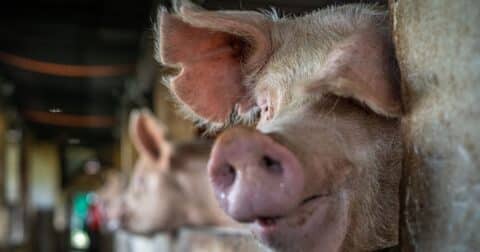Fact Check
Fact-Checking Claims Made About Oklahoma’s Lawsuit Against Tyson Foods
Food•5 min read
Reported
British, Irish and Canadian hog farms are looking to get ‘Prop 12 certified’ to sell pork to the golden state.


Words by Sophie Kevany
Hog farmers are facing a tough market these days, yet some intrepid pork producers are hoping to find a financial bright spot in an unexpected place: California. Pork sold in the golden state must now be compliant with Proposition 12, the landmark California welfare regulation that requires farmers to give pregnant pigs and other farm animals more space than the typical factory farm. The California pork industry isn’t big enough to satisfy demand in the state, so farms in Canada, the UK and Ireland, among others, are now looking to sell Prop 12 compliant pork, and improve their export numbers.
There is now at least one Prop 12 certified pork producer in Canada and one in Ireland, while the UK is touting certification as a ‘gateway’ to California. According to one certifier’s press release, the golden state only produces 1 percent of the 15 percent of U.S. pork it consumes. This makes “the Prop 12 certification a significant market opportunity for UK pork producers.”
As U.S.-based industry analyst Kevin Van Trump wrote on his website, since only a “small fraction of U.S. producers” are compliant with Prop 12, “pork producers around the globe are eager to fill the gaps in the state’s huge market.” Several Prop 12 certifiers are currently listed on California’s government website. These firms are already offering certification to pork producers in a dozen countries, including the UK, Denmark and Brazil.
In Ireland, the national agri-food trade body, Bord Bia in Gaelic, tells Sentient that Irish pork sales to the U.S. are “expected to show some growth” this year, thanks in part to demand for higher-welfare pork that meets California’s new rules. Having reached a peak of just over $30 million in 2021, the country’s pork sales to America fell back sharply to about $18 million in 2023. In other words, the pressure is on to increase profits.
Both inside and outside the U.S., pork producers with higher welfare standards have less work to do in order to meet Prop 12’s requirements.
In the UK, about 40 percent of sows are raised outdoors and individual ”sow stalls” have been banned since 1999, says Ines Ajuda, an advocate with Eurogroup for Animals. Farrowing crates, which house pregnant pigs in a confined space but allow piglets to nurse, are still common, and are allowed for limited time periods under Prop 12. The Italian pork brand, Fumagalli, is an example of a high welfare producer that could take advantage of the Prop 12 rules for export sales, Ajuda says. “For those producers that have already committed to going cage-free, Prop 12 is an added impetus.”
In the U.S., pork producer Niman Ranch has been in Prop 12 compliance since before the National Pork Producers’ Council sued to strike down the California law, a legal battle that ultimately failed at the Supreme Court.
Canadian pork producer, DuBreton, which has already obtained Prop 12 certification is, like Niman Ranch, an organic, antibiotic-free and crate-free producer. The company’s ethos is “Allow pigs to be pigs!” and in 2018, it claims to have reached and exceeded its goal of humanely raising 340,000 pigs in three years.
Though U.S. pork groups remains committed to reversing Prop 12, there is evidence that the industry is slowly adapting to the new standard. But just how well the new rules are enforced will hinge on oversight. “A lot will depend on the certifier selected to check compliance,” says Ajuda. Selling in California without being compliant exposes producers to legal action, she says. “That is the biggest advance. It has raised the risk of noncompliance tremendously.”
To obtain Prop 12 certification, farms must keep pregnant pigs in spaces that have “at least 24 square feet of usable floor space,” and cannot hold them for longer than 6 hours in confinement for artificial insemination.
Yet we found that certifiers were reluctant to talk about the certification process. Emails to Clover Leaf AWS, the US-based company that has certified at least one Irish producer, were not answered. The UK certifier, NFS, which offers Prop 12 approval, did not respond substantively to Sentient’s questions either, saying: “As a company we do not speak to journalists or journalism.” We also received no substantive response from the Irish government, Bord Bia or Meat Industry Ireland on how Irish pork producers would endeavor to meet Prop 12 standards.
Increasing space and giving pigs room to move, even a little bit, are clearly improvements in the eyes of animal protection advocates. When female pigs aren’t kept in a confined crate, they will turn around up to 200 times in a day, animal researchers have found. Narrow gestation crates, in which most U.S. sows are confined for up to 16 weeks during each pregnancy, typically measure 14 to 16 square feet, without giving pigs any room to turn.
Yet critics argue that Prop 12 does not go far enough to reduce animal suffering — in part because the law exempts some types of pork products, applying only to whole pork cuts. A Prop 12 impact assessment estimates that the exempted meat represents about 42 percent of all pork consumed in California.
And beyond Proposition 12, critics of higher welfare meat point out most welfare certification schemes have little to no oversight. Investigations often uncover gaps between what a certificate promises consumers and the reality of life for farm animals, including pigs. According to Alice Brough, a former pig veterinarian who worked as a consultant on a recent Irish pork farm investigation, Bord Bia only independently audits farms once every 18 months, despite promising consumers high-welfare pork.
Many animal welfare labels lead consumers to believe producers value animal welfare, Brough told Sentient in an email, but as investigations show, “they categorically do not protect animals from suffering.”
The bottom line: Proposition 12 may only provide for a modest improvement to animal welfare, as many animal protection advocates argue. Most factory farms are still more like the 5,000-hog factory farm in Iowa, China’s high-density skyscraper farms or the dirty, packed Irish sheds shown in a recent undercover investigation. But with a global pork industry in flux, the opportunity offered by the California market could result in more producers shifting how they raise pigs, even if only by a few feet.